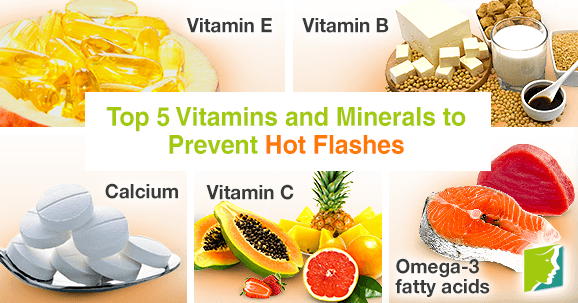Sometimes, even with a full plate, you can't pack in all the nutrients you need to ease your menopause symptoms. However, when it comes to hot flashes, there are a few that you should consider that provide extra benefits to menopausal women. Check out this list of the top five vitamins and minerals for hot flashes.
Vitamin E
Studies have shown that vitamin E as well as curcumin can reduce menopausal hot flashes. Find the essential nutrient in foods such as nuts, seeds, green leafy vegetables, and fortified options, like breakfast cereals, juices, and spreads. If wishing to supplement for maximum potency, consult your doctor about appropriate dosages before beginning a vitamin E regimen.
B Vitamins
B vitamins, especially folic acid (B9), have also been scientifically proven to calm your hot flashes. When you consume this vital nutrient from soy, you get added benefits like protein and fiber as well as phytoestrogens. Among the tasty soy-based foods are soymilk, soy yogurt, tofu, tempeh, and miso. Other good sources of B vitamins like folic acid include asparagus, spinach, and legumes.
Calcium
While calcium intake is extremely important for women's bone health, this mineral is also an essential electrolyte that is sometimes lost in the sweat from hot flashes and night sweats. The National Institutes of Health (NIH) sets its standard recommendation of calcium intake at 1,000 mg each day for women ages 20 to 50 and 1,200 mg daily for women over 50.
Vitamin C
Vitamin C, also known as ascorbic acid, is an antioxidant vitamin. It has been used in combination with hesperidin, a compound from citrus fruits, to reduce hot flashes. As an added benefit, vitamin C supports the production of collagen, an important structural protein in skin that can help reduce dryness and itchiness. Adding plenty of citrus fruits to your diet can help calm hot flashes and other menopause symptoms.
Omega-3 Fatty Acids
These polyunsaturated fats are vital for cell maintenance and can benefit women with hot flashes. Supplementation with omega-3 has shown to be helpful in reducing the frequency and intensity of hot flash episodes. Omega-3 is found in oily fish and soy, while fish oil and sacha inchi supplements are another way to consume the nutrient.
More Information
Although some women incorporate the aforementioned nutrients into their diet and moderate their intake of hot flash triggers - spicy foods, nicotine, caffeine, and alcohol - in attempts to manage the symptom, these measures do not directly address the root problem, which is hormonal imbalance. Click on the following link to find out more about hot flash treatments to complement a healthy diet and balance hormone levels.
Sources
- Bani, S. et al. (2013). The Effect of Folic Acid on Menopausal Hot Flashes: A Randomized Clinical Trial. Journal of Caring Sciences, 2(2), 131-140. doi: 10.5681/jcs.2013.016
- Complementary Therapies in Medicine. (2020). The effect of oral capsule of curcumin and vitamin E on the hot flashes and anxiety in postmenopausal women: A triple blind randomized controlled trial. Retrieved January 18, 2021 from https://www.sciencedirect.com/science/article/pii/S0965229919313068
- Lucas, M. et al. (2009). Effects of ethyl-eicosapentaenoic acid omega-3 fatty acid supplementation on hot flashes and quality of life among middle-aged women: a double-blind, placebo-controlled, randomized clinical trial. Menopause, 16(2), 357-366. doi: 10.1097/gme.0b013e3181865386
- MedlinePlus. (2017). Vitamin E. Retrieved June 21, 2019, from https://medlineplus.gov/ency/article/002406.htm
- National Institutes of Health. (2018). Calcium. Retrieved June 21, 2019, from https://ods.od.nih.gov/factsheets/Calcium-HealthProfessional/#h7
- PeaceHealth. (2015). Flavonoids: Uses. Retrieved June 21, 2019, from https://www.peacehealth.org/medical-topics/id/hn-2844004
- Ziaei, S. et al. (2007). The effect of vitamin E on hot flashes in menopausal women. Gynecologic and Obstetric Investigation, 64(4), 204-207. doi: 10.1159/000106491



